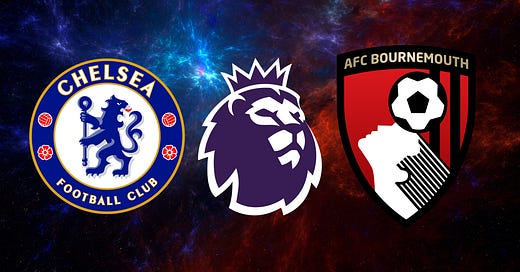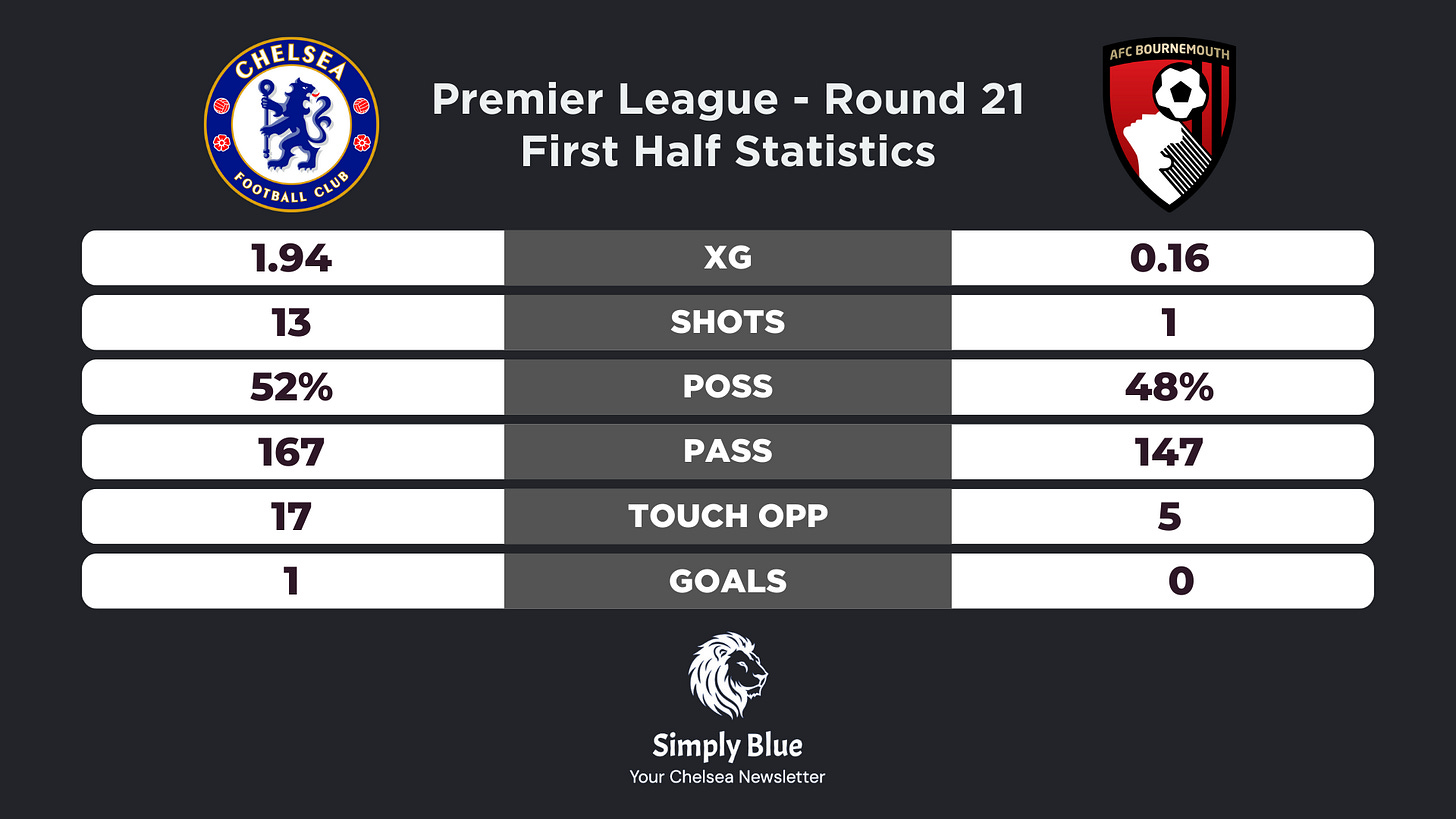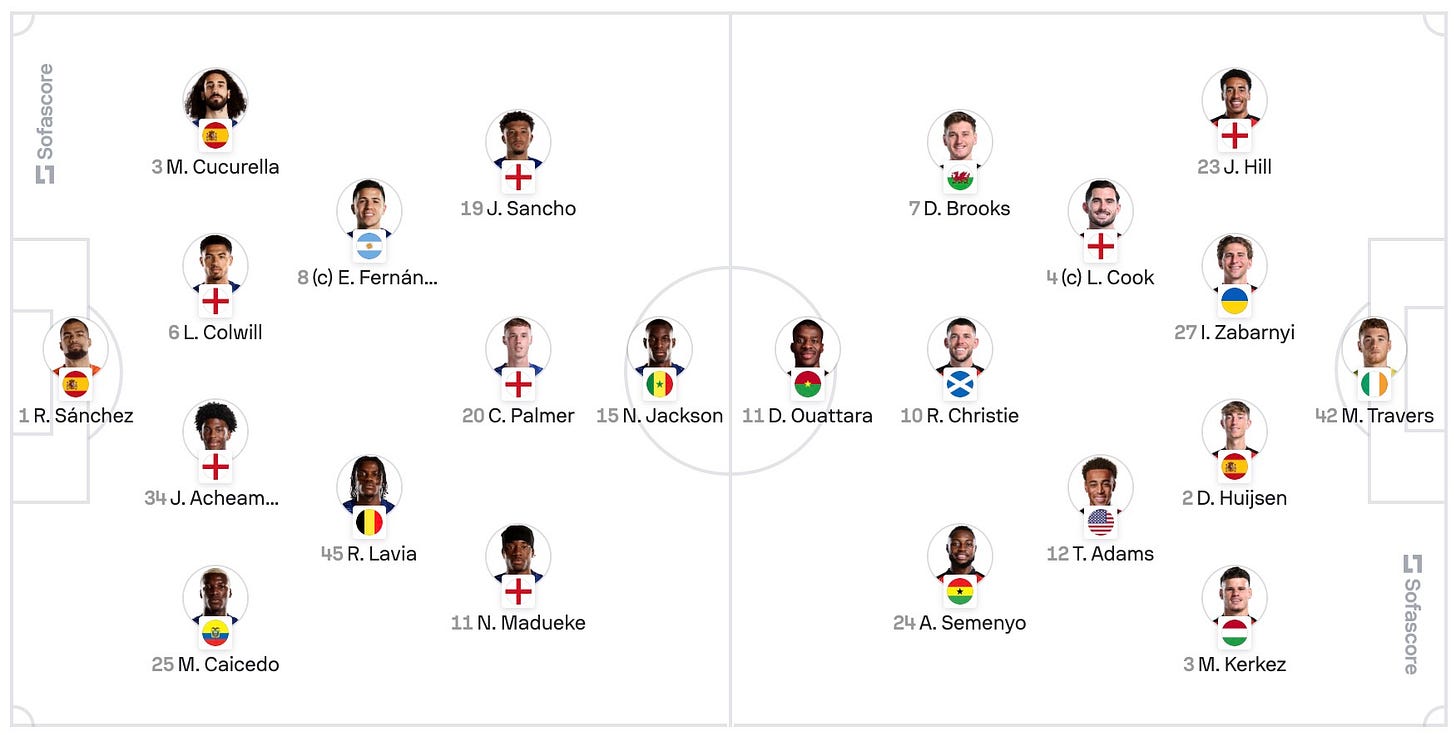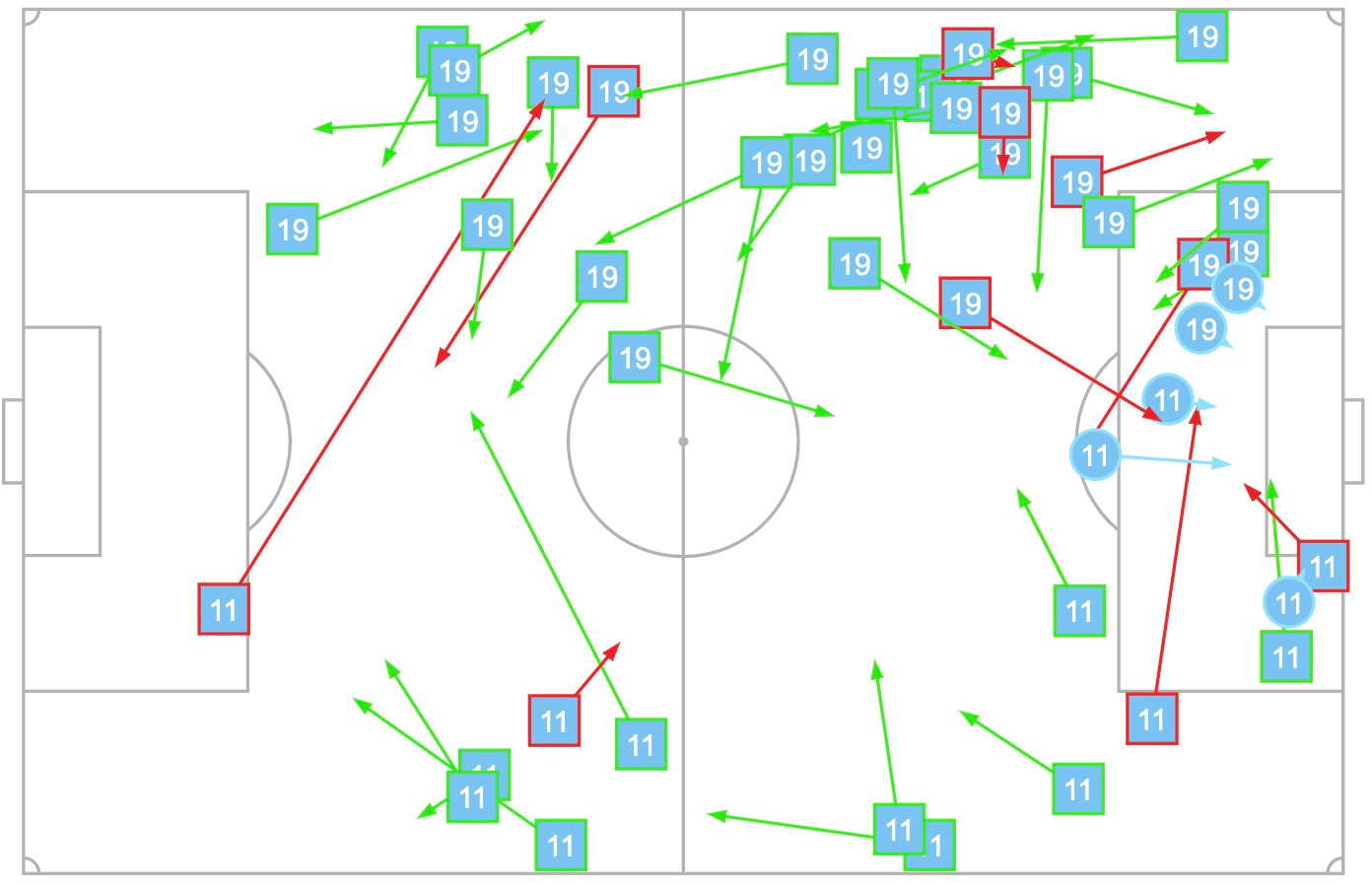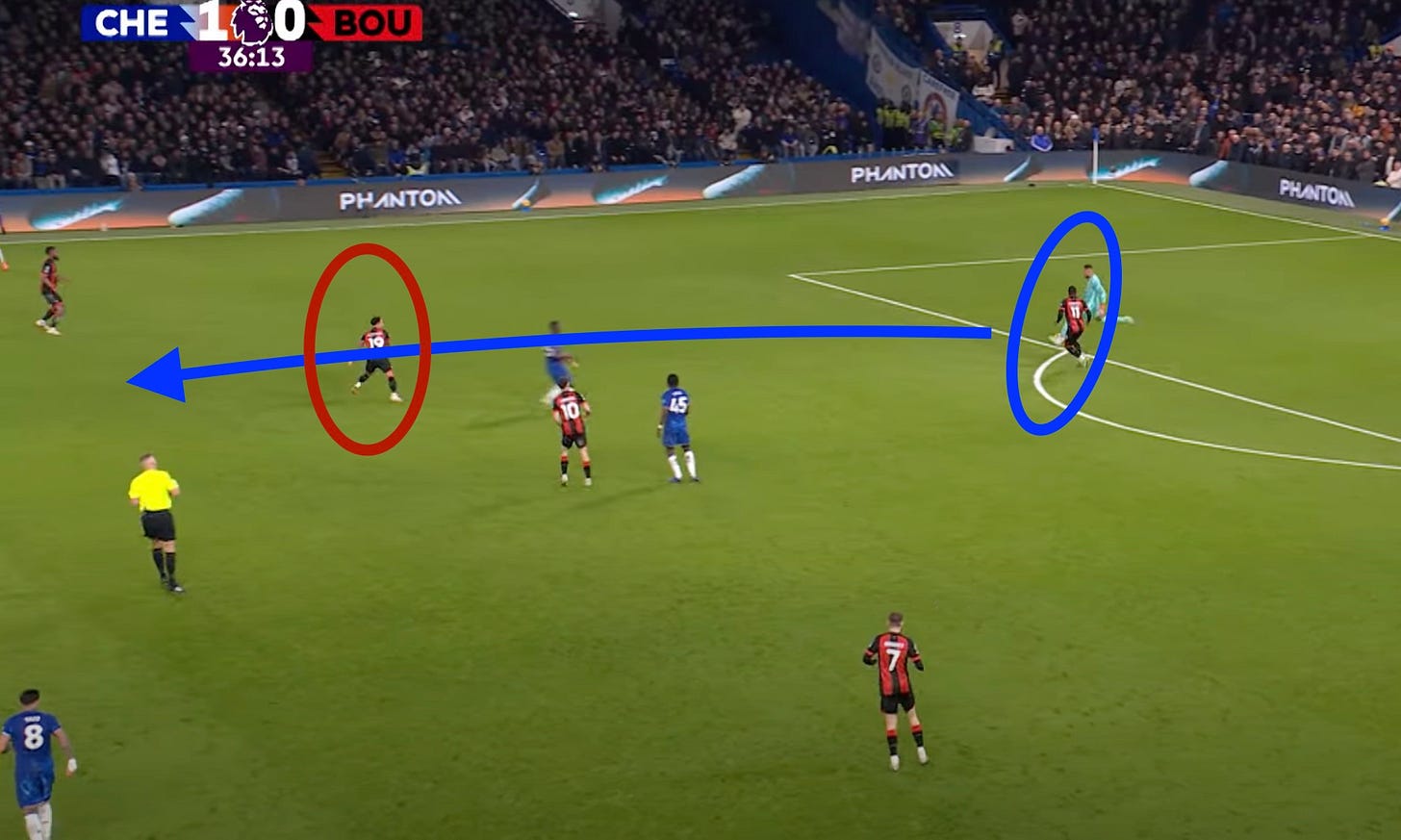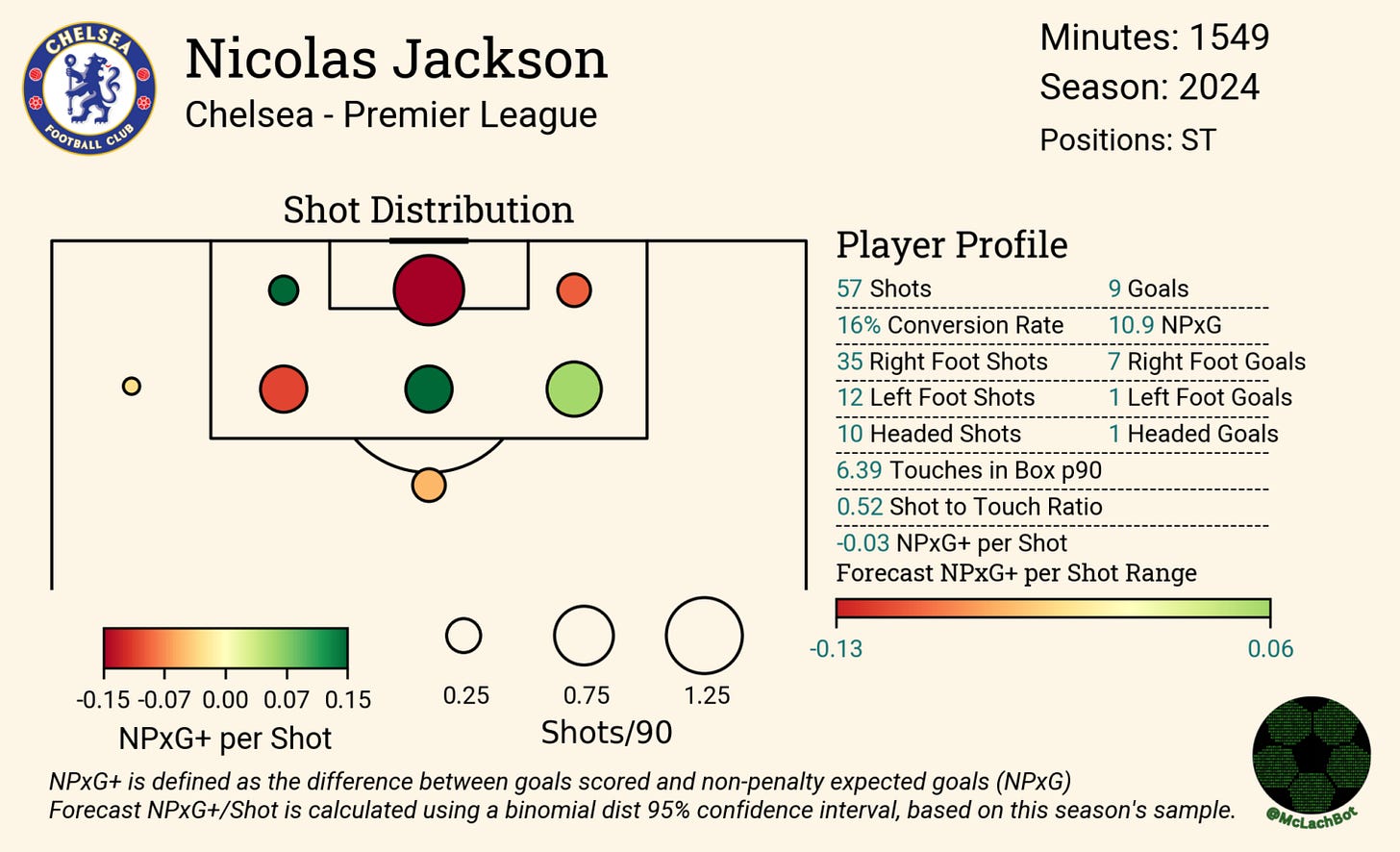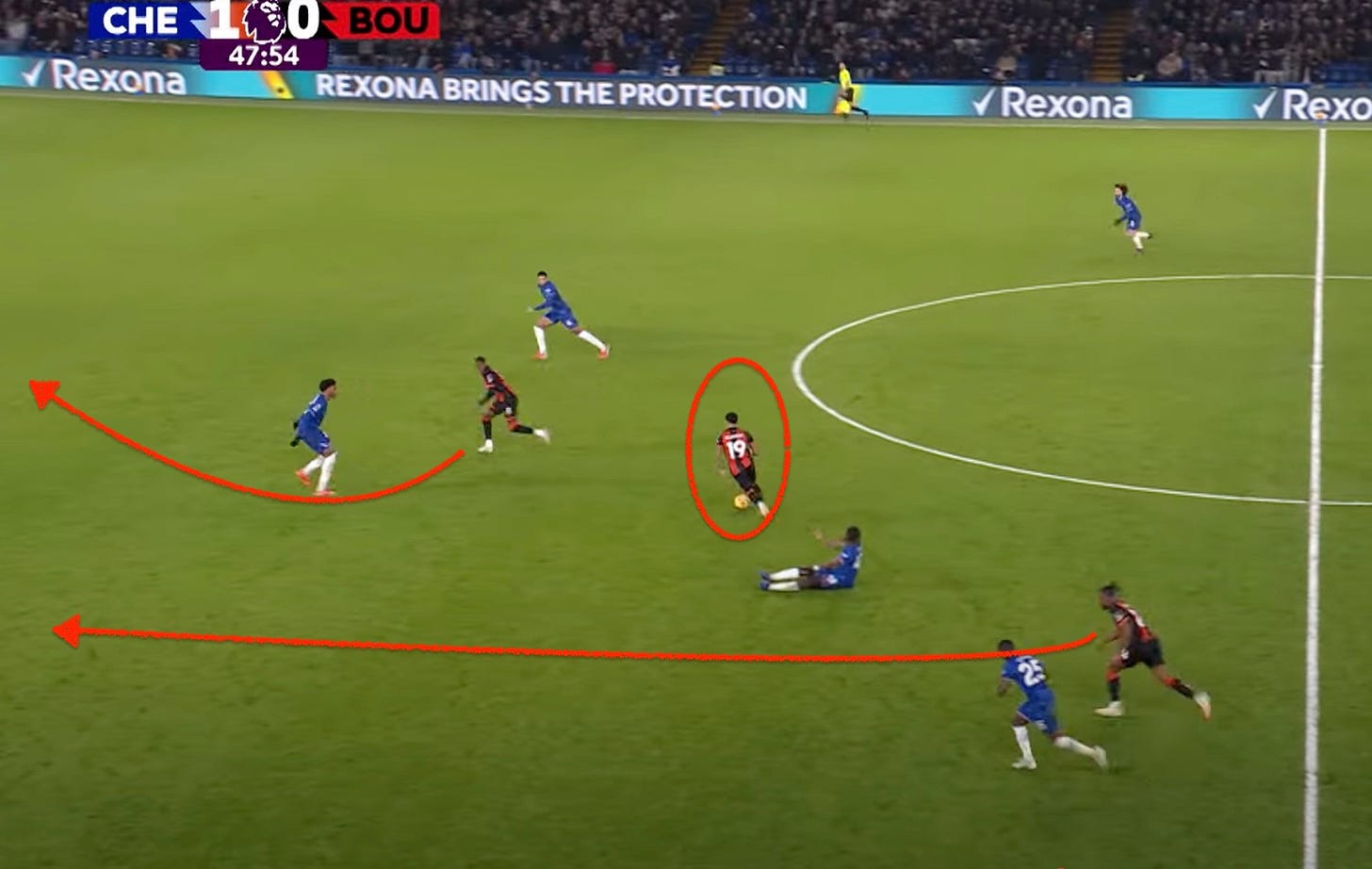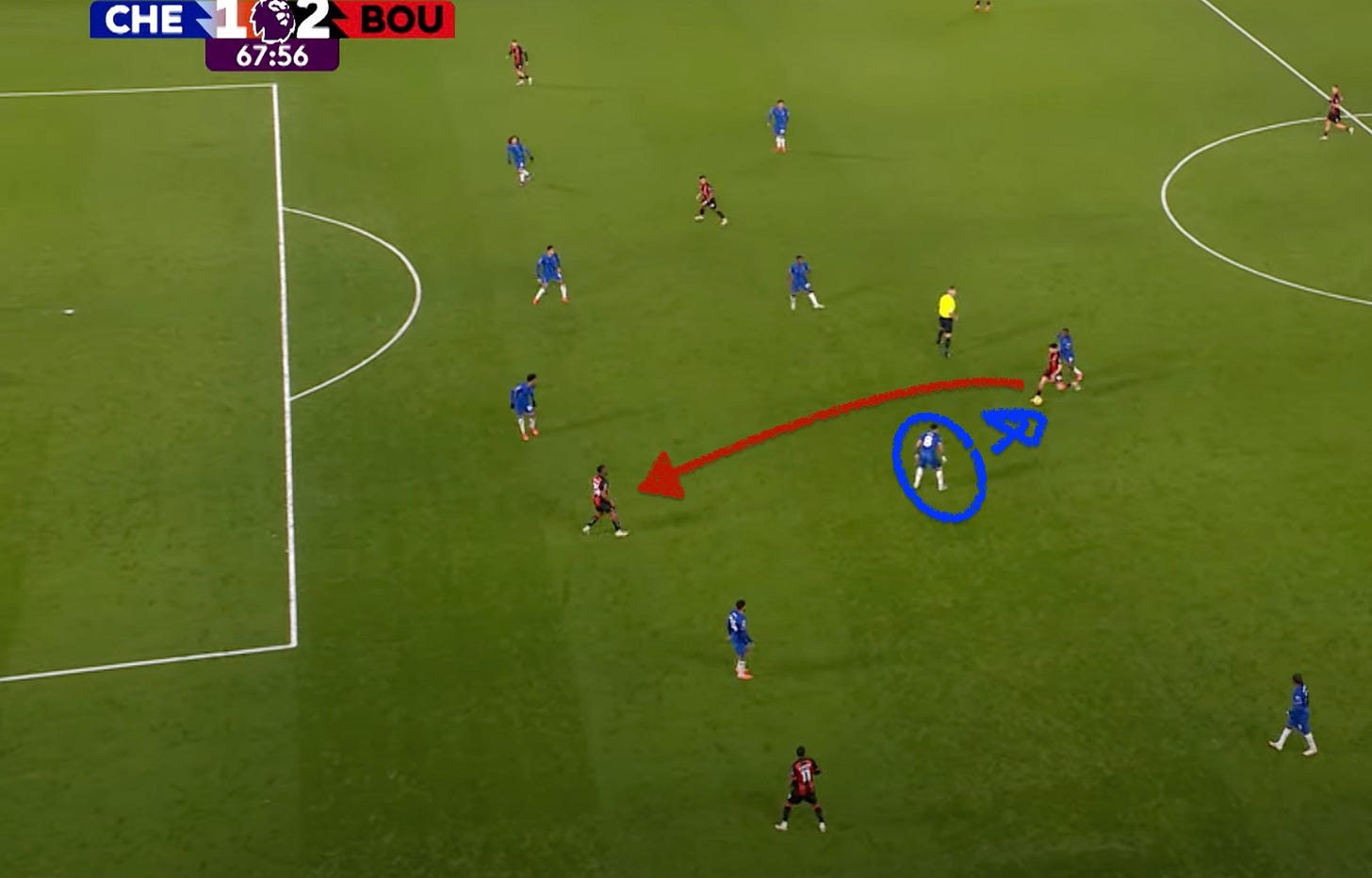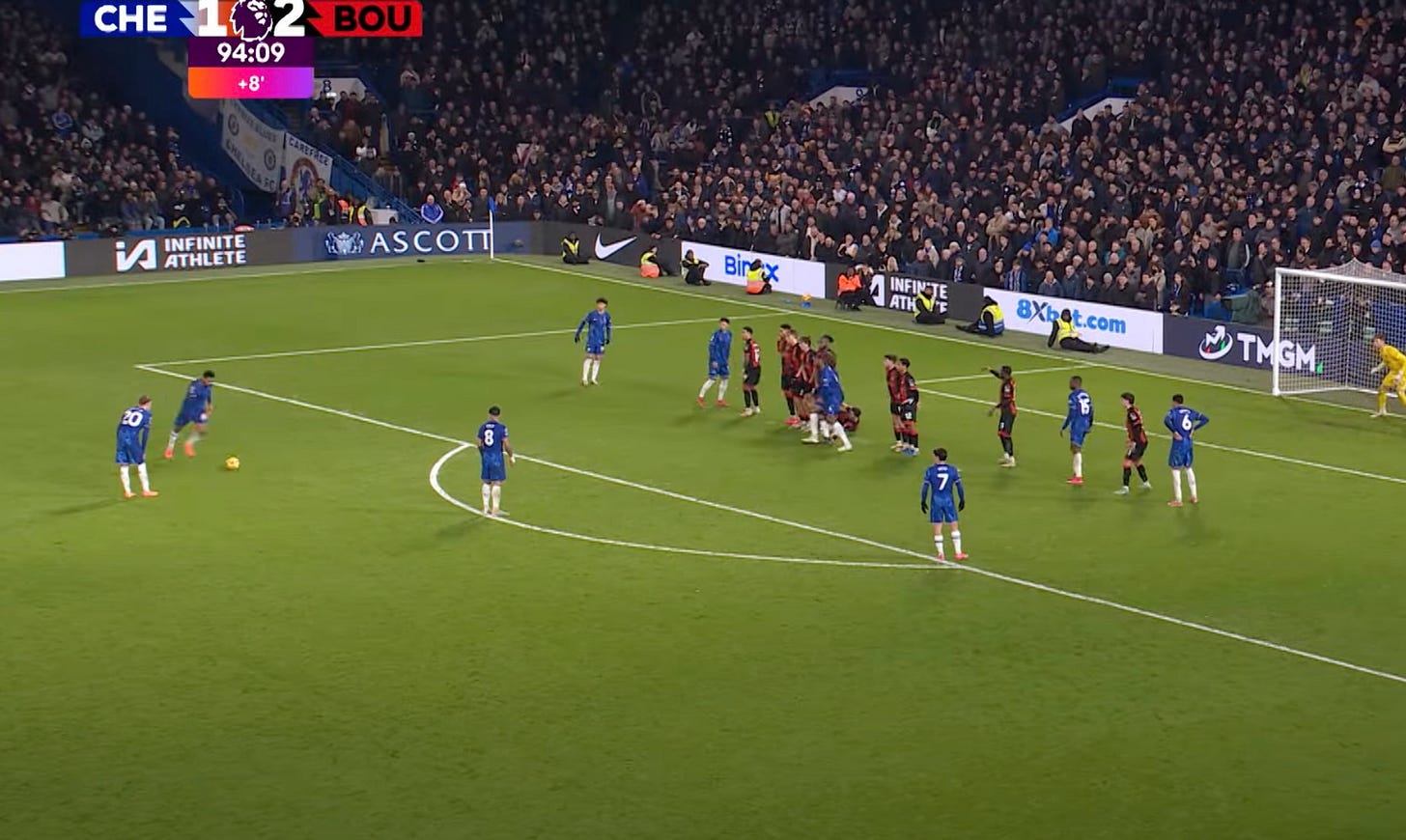Match Analysis: Chelsea vs Bournemouth - Missed Chances and Salvaging a Point
Huge chances but Chelsea lacks the clinical edge to take all three points. Reece James rescues a point with a late free kick
Chelsea’s winless streak extends to five games after the 2-2 draw with Bournemouth at Stamford Bridge in a game that was poised to go in The Blues’ favor at half time. After 45 minutes, Chelsea overpowered Bournemouth in terms of xG, generating 1.94, compared to a mere 0.16 from The Cherries. Cole Palmer put Chelsea ahead early on with a composed finish after a Nicolas Jackson, who squeezed the ball between three opponents, launched him with a through ball. Bournemouth’s major, and only opportunity came after Robert Sanchez misplaced a pass that was intercepted and put The Cherries in a prime position to score.
Yet the second half tells a different story, where Bournemouth capitalized on mistakes and scored twice. Justin Kluivert dispossessed Romeo Lavia in midfield, which left him ample space to run and set up Semenyo with in Sanchez’s box. Caicedo fouled and Kluivert transformed the penalty, restoring the balance on the scoresheet. In the 66th minute, Bournemouth’s pressure caused Enzo Fernandez to make an uncomfortable pass to Noni Madueke to get out of the first third of the pitch, conceding possession. Then, two passes later from the throw-in, Semenyo was left in a one-on-one situation in the box against Acheampong and his powerful left-footed show beat Sanchez and put the Cherries in the lead.
Chelsea pushed hard in injury time, immensely pressuring Bournemouth’s defense, who gave away a free kick close to the left side of the box. Reece James’ powerful shot to the far post salvaged a point and Maresca’s winless streak extended to five games.
Setting Up Against Bournemouth
Enzo Maresca’s starting lineup against Bournemouth is something that he used before, with Robert Sanchez in goal and a back four comprising Marc Cucurella, Levi Colwill, Josh Acheampong (who got his second Premier League start) and Moises Caicedo as the right full-back. Romeo Lavia and Enzo Fernandez were Chelsea’s two pivots in this game. The idea is, of course, for Moises Caicedo to invert in line with Romeo Lavia and provide that double pivot in front of the remaining back three. Enzo Fernandez would push up on the left side to form the front five, together with Cole Palmer, Jadon Sancho, Nicolas Jackson and Noni Madueke.
This setup provided Chelsea with stability in midfield, relying on the Lavia-Caicedo pair, while also putting Enzo Fernandez in a position where he could use his creativity and not be a threat when Bournemouth would set up on the counter. And it showed in Fernandez’s performance through the game, as he generated the most chances (7), completed the most passes (49) and accumulated a xA of 0.24.
The only major change from the usual formula we have seen lately was Noni Madueke on the right wing, recently recovered after illness, instead of Pedro Neto.
Dull Clinical Edge - Lack of Efficient Finishing
The first half was perfectly executed in creating chances. Chelsea generated a xG of 1.90 and gained the lead in the 13th minute. Nicolas Jackson squeezed the ball through three opponents, bypassing Bournemouth’s midfield, which left Chelsea in a five-on-four advantage against Bournemouth’s defensive line. Jackson dropped deeper throughout the game, facilitating the build-up and helping The Blues progress through the midfield. Cole Palmer, in the right half-space, made a run cutting inside and Nicolas Jackson timed his pass perfectly to catch him onside. This left Palmer alone against Travers, and tricked him with a faked chip, to finish elegantly into the empty goal.
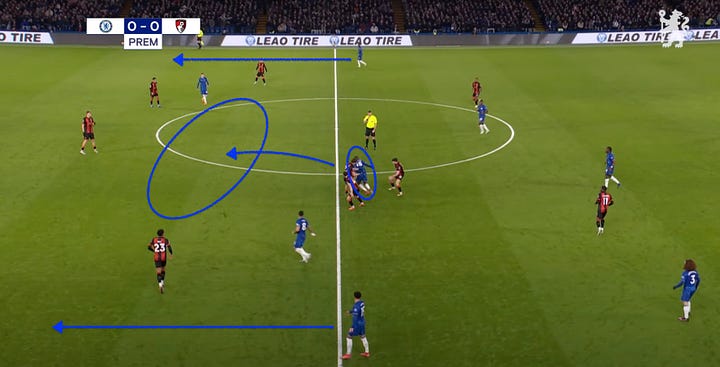
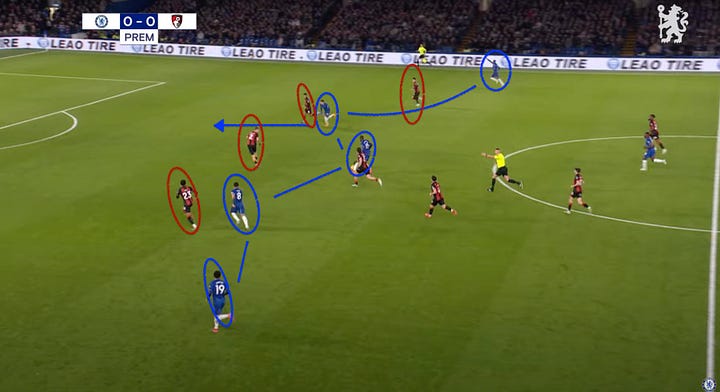
Jadon Sancho and Noni Madueke also created chances during the first half while providing a masterclass on dribbling. Sancho tricked Bournemouth’s defenders with 4/5 successful dribbles (the most completed dribbles in the game) while Madueke penetrated the box, having seven touches in Bournemouth’s penalty area. While Sancho’s incursions ended with two blocked shots, Madueke produced several cutbacks leading to dangerous chances with an xA of 0.32.
Robert Sanchez and his Trademark Mistake
Of course, it is not a proper Chelsea game until Robert Sanchez makes his characteristic mistake of passing the ball straight to the opponent or making a weak incisive pass that is easily intercepted. In the 37th minute, Sanchez tries to find Cole Palmer dropping on the right wing with a progressive pass but did not spot Kluivert predicting that pass and rushing to cut the lane. He intercepted the pass and penetrated the box. After the unsuccessful cross, Bournemouth scrambled and recovered the ball inside the box and sent it to Kluivert, who was free. Fortunately for Sanchez, the ball hits the woodwork and Chelsea is saved.
Is Nicolas Jackson Regressing?
The first half was a reminder of last season’s Nicolas Jackson. The striker generated the biggest xG of the game from open play (1.11 xG) but did not score. He had huge chances in the 33rd and 44th minutes, but his shots did not hit the target, with the ball bouncing before the shot, causing him to strike improperly. Another huge chance came just after Bournemouth hitting the woodwork, with Chelsea on the counter. Unfortunately, he was not much luckier than Kluivert and he hit the same right post with his shot.
At the start of the season, Jackson was much more clinical, and scored in line if not even higher than his xG suggested. Right now, Jackson is the 9th best goalscorer in the Premier League, with 9 goals, not a disappointing performance at all. His xG suggests 10.79 predicted goals until this point, which means he is slightly underperforming. Of course, xG stabilizes over time, and Nicolas Jackson still has plenty of chances to over-perform or score in line with expectations. Hopefully, we will see more performances similar to the beginning of the season than to this game, and Jackson will continue to grow more clinical over time. The improvement is there, but I would love to see even more.
Chelsea Losing Stability in the Second Half
The second half brought a shift in dynamics with Chelsea losing their stability and granting Bournemouth more chances and opportunities. While Bournemouth had only one shot in the entire first half, that number grew to six by the end of the game. Just after the break, Romeo Lavia was dispossessed in midfield by Kluivert, who started Bournemouth’s counter.
Levi Colwill took Kluivert in his marking while Ouattara’s clever run drew Acheampong towards the centre of the box, leaving the left side empty for Semenyo to penetrate the box and be found by Kluivert. Moises Caicedo, who was slightly outpaced and unable to catch up, fouled from behind giving Bournemouth the penalty.
Romeo Lavia was substituted by Reece James, which shuffled a bit of Chelsea’s structure by putting Moises Caicedo back in midfield, with James taking the full-back role. The substitution could not be avoided, as Lavia was struggling to keep up, which is normal when coming back from injury. The problem is that Moises Caicedo would mostly remain the sole player responsible for covering Chelsea’s midfield, which creates loads of gaps to be exploited.
Bournemouth’s second goal shows just that. Following the throw-in, Christie found himself in midfield with minimal pressure, enabling him to deliver a precise pass that set up Semenyo for a one-on-one against Acheampong. Nicolas Jackson dropped to chase him, but Enzo Fernandez could have applied some pressure on Christie. But Fernandez stood as the pass went through, and Semenyo smashed it in.
The Yellow Card Controversy
The 54th minute saw the most controversial moment of the game, with Chelsea set to begin their counter attack through Robert Sanchez. Marc Cucurella sprints into space on the left wing, and is halted by David Brooks, who extends his arm and hits Cucurella’s face, dropping him to the ground. John Brooks is called to the side of the pitch, to review the action from the VAR room. After a minute of looking at the footage, he shows David Brooks the yellow card.
This decision was heavily criticized by both fans, staff and Enzo Maresca, since there was no intention of playing the ball (which was not even in play at the moment) and the gesture looked very deliberate aiming to stop Cucurella from getting the ball and starting the counter. The Premier League Match Centre explained the decision on Twitter.
“VAR recommended an on-field review for a possible red card to Brooks for violent conduct. Upon review, the referee deemed that the challenge on Cucurella was a reckless action and not violent conduct – and issued a yellow card to Brooks.”
Reece James’ Free Kick Brings a Point
Chelsea put on a lot of pressure at the end of the second half, trying to find the equalizer but with no success. Three minutes into injury time Christie takes Joao Felix down, at the right side edge of the box. Cole Palmer and Reece James stepped up to take the free kick, and honestly, I thought Palmer would shoot, forgetting that Reece James is a set-piece specialist. But since I haven’t seen him for so long, can you actually blame me for believing so?
James delivered and smashed it in with a powerful low shot that rattle the inside of the far post to end the game level and get a point.
Conclusions
Chelsea did not get more from this game, not because of a lack of chances created but a lack of finishing in front of the goal. It was a solid game by the Blues, but they failed to close the game when they had control in the first half and paid the price. Chelsea’s winless streak extends to five games in what could have been the perfect return to form. The good thing to take from this game is that Chelsea was creative, generated chances and controlled the game, especially in the first half.
In the post-match press conference, Enzo Maresca said: “I’m always worried, but I’m more worried when we don’t create and we don’t play well.”

